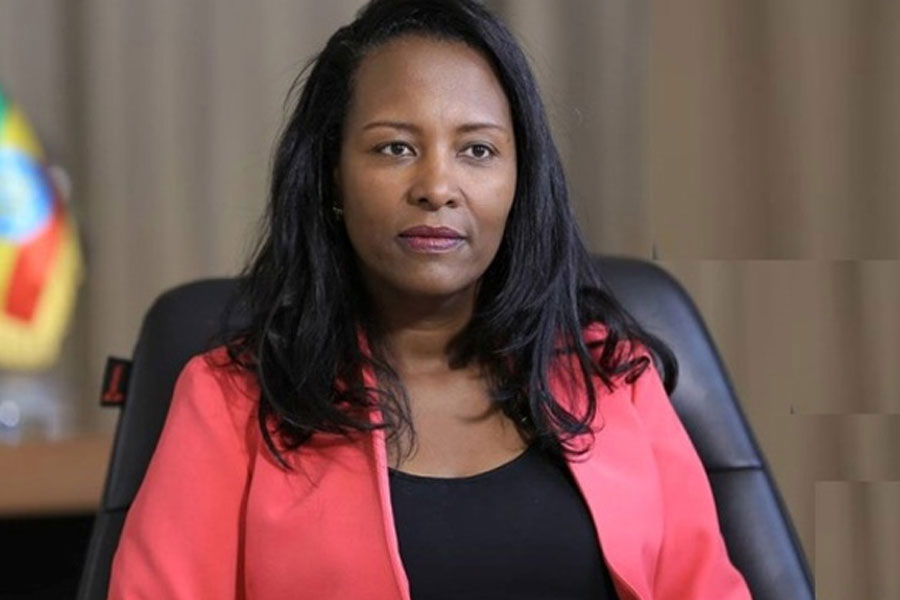
In-Picture | Feb 13,2021
Fortune: Your bank commemorated its 25th anniversary a few weeks ago. May you take us back, albeit briefly, through the triumphs and tribulations over the years?
Aklilu Wubet: The 25th anniversary has allowed us to take stock of our past. For one, founding an institution and reaching a Silver Jubilee is a great accomplishment on its own terms. We have had an ongoing program for a year about the anniversary.
The main issue the program tried to look at was how Wegagen Bank responded to the economic and political changes after 1991. We were one of the first private banks established shortly afterwards. It was important to highlight our contributions to this. Another issue was the recent challenges that arose due to political and economic circumstances. After the conflict in the northern part of the country, groups that did not realise that Wegagen Bank is an essential financial institution for the economy have harmed us. We were wronged.
We are a place of business. Ethiopians own Wegagen Bank. It has over 5,000 employees from all sorts of backgrounds and over 2.5 million customers. It has some 5,000 shareholders. Importantly, it is also a bank that abides by the law of the land. It is a bank with many contributions to Ethiopia’s economy and plays a role in seeing the law enforced.
The occasion of the Silver Jubilee allowed us to address these misconceptions. We have communicated ourselves to the business community, depositors and society. We have also carried out our social responsibilities, encouraged employee participation, and introduced the Bank’s jingle and a documentary that thoroughly reflected the Bank’s journey. The anniversary, in general, serves as a monumental sprint as we go forward.
For the next 25 years, Wegagen Bank will take inspiration from its accomplishments, learn from its experience and expand the banking industry in Ethiopia and further.
Q: Wegagen has seen a fair share of management shakeups in the past few years. This must be not very encouraging, including to lower-level managers. How do you ensure the human capital stays focused, incentivised and retained?
When there is a change in management, priorities change, and with it, the confidence of staff members, shareholders and regulatory bodies could be challenged. It is ideal for the management to stay on board for some time. But this is not always the case.
In the case of Wegagen Bank, it is not because of the Bank itself. And the fact that management changes happened during a difficult time has not been without distress. My predecessor left for medical care, where she had to continue her treatment. She could not be back. She was off to a good start with the Bank. I could not have been happier if she had continued to be in charge all the way. A management turnover is bad if there is tension between the Board of Directors and the management.
But Wegagen Bank is an institutionalised bank. It has robust policies and procedures in place. This indicates that the management is from inside, including the presidents. We conduct restructuring right away to implement our newly formulated strategy. This has boosted employee confidence. Having learned from our shortcomings, we are also working on a management succession plan for the future. We have now come out of this problem and managed to compete with other banks.
Q: What part of the banking business is currently exciting to you? Retail? Investment? Digital? Forex trade? Niche market? Where do you see the potential?
In the strategy we recently approved, the central thematic area is digitisation. It is a new concept. It is about accessibility. Individuals can pay, deposit, receive, get loans, and access information without going anywhere. Once technology comes, it sticks around. Anyone can access our services without needing to visit a brick-and-mortar branch and with a touch of the phone. As we make this technology broadly accessible, individuals will be encouraged to save their money in banks. National saving rates will grow. When you buy, transfer to a bank account and do the same when you sell, the money outside banks is reduced.
Most of all, people will be able to participate in a secure banking system. We are in the process of developing platforms, and the new products we introduce will be anchored on digital. Our neighbours are making much better use of this. The potential is untapped. Of course, like any bank, we also work on financing exports and investing the foreign currency. Slimming down the trade deficit is a delight to any bank. But the theme would be digital.
Q: Other banks are also looking forward to the digital banking frontier. Are you worried that the convergence of digital technologies and finance (FinTech) or the emergence and consolidation of Telebirr and, potentially, M-Pesa, threatens the viability of traditional (legacy) banking?
Digitisation is an excellent opportunity for telecom companies, either for M-Pesa or Telebirr. That does not mean people are going to stop depositing money in banks. It means that what we offer is more prominent. We may choose to use our own platform or that of others. But whatever the case, all digital transactions ultimately go through banks. This technology is here. There is no avoiding it. The question is, how can we maximise our advantage? We needed a complimentary design, the necessary training and a way of thinking. We are actively working on that.
Q: Inflation, coupled with the erosion of the value of Birr against other currencies, has made saving a poor strategy for holding on to value. What would possibly induce anyone to save at banks such as yours?
Saving is not a choice. A quote says: “The poor have to save,” It is a necessity. Saving leads to investment, more employment, and more savings. The only intervention people have is through saving. The policy response to inflationary pressure should have been to raise interest rates, which will incentivise saving. To encourage investment and discourage consumption, saving should be encouraged. But when you increase saving rates, banks also raise loan rates. This could increase the cost of debt and may harm banks’ profitability. Maybe, instead, the government sells Treasury Bills (T-bills) to decrease broad money.
But it is also important to ask where the inflation comes from. Is it a supply shock, imported or disinvestment? Or is it the consequence of the conflict? These things must be thoroughly analysed. I am sure that the authorities are looking into this.
In our case, there are ways we are trying to encourage saving. Start with segmenting customers and categorizing them by gender and age. We provide credit and foreign currency access based on saving rates. Getting people to save is possible by reaching them where they are, including through digital services and raffle systems.
Q: Treasury Bill (T-bill) holding by commercial banks has grown significantly over the past years. Nonetheless, the yields on the bonds are much lower than they are on lending interest rates. Why is the banking industry buying T-bills so much?
Usually, the funds used to purchase treasury bills are the residuals from the lending activities and liquidity preference. Eight percent is not so bad if it is excess liquidity. Banks also have a role in improving macroeconomic conditions. T-bills are used to cover budget deficits, reduce the broad money supply and finance public projects. These indirectly help the banking industry because it improves the macroeconomic conditions. The purpose of banks is not just to intermediate between savers and investors. This is also our task.
Of course, in the end, you can only buy T-bills if you have the excess funds. The fact that the yields have grown substantially over the years after they were initially floated has helped. It is better than parking the money in our vaults.
Q: How do you feel about the potential opening of the financial industry to foreign banks? It could mean being bought out, something your shareholders may find attractive.
Ethiopian banks are infants. They need to grow in human capital and technology, and the National Bank of Ethiopia (NBE) needs to develop its regulatory capacity. It is for banks to improve management and introduce more competitive products. There is an opposing view that foreign banks will bring expertise, foreign currency and better processes, benefiting the industry. These two views have always existed and will continue to exist.
I would have preferred if we had waited. But I also wonder about what we have done thus far. As banks, we do not even cooperate in infrastructure sharing. We are competing in profits or by poaching professionals. I ask if we have done a good job competing. Perhaps we need something to push us to better ourselves. We are still concerned with profits. But a CEO should be about growth. We have not done the job of elevating infrastructures, quality, customer service and human resources.
The policymakers have already indicated the road ahead. The central bank is making preparations. Hopefully, it is also creating a modality that considers existing banks. It has the responsibility to do so. For instance, we would be excited if a bank came here and would like to work with us in a joint venture partnership. We would be glad to work with them if they bring the technology, human capital and foresight. We have established a committee to design a strategy in the case of the financial sector’s opening up to foreign participation. What will be Wegagen’s stake in this? And its meaning? How will we win the confidence of the in-comers?
Q: You took the helm at Wegagen Bank recently. What legacy would you like to leave behind when the time to move on comes? In what state will you want to see Wegagen Bank upon your departure in the future?
We are entering the era of digital. In other countries, transactions occur through digital platforms, thus banks. Tax evasion, hoarding and waste are controlled. It broadens access to every level of society. Someone with an idea but without the resources to execute it gets access to credit. Wegagen, in 15 or 20 years, will be a bank fully open to new ideas, technologies, and led by professionals. I want to see its services and influence expand in Ethiopia and beyond.
PUBLISHED ON
Jul 24,2022 [ VOL
23 , NO
1161]

In-Picture | Feb 13,2021

Radar | Jan 09,2024

Fortune News | May 23,2020

Radar | Jun 15,2025

My Opinion | Aug 13,2022

Fortune News | May 11,2024

Radar | Aug 25,2024

In-Picture | Jun 22,2024

Radar | Jul 17,2022

Fortune News | Jun 10,2023

Dec 22 , 2024 . By TIZITA SHEWAFERAW
Charged with transforming colossal state-owned enterprises into modern and competitiv...

Aug 18 , 2024 . By AKSAH ITALO
Although predictable Yonas Zerihun's job in the ride-hailing service is not immune to...

Jul 28 , 2024 . By TIZITA SHEWAFERAW
Unhabitual, perhaps too many, Samuel Gebreyohannes, 38, used to occasionally enjoy a couple of beers at breakfast. However, he recently swit...

Jul 13 , 2024 . By AKSAH ITALO
Investors who rely on tractors, trucks, and field vehicles for commuting, transporting commodities, and f...

Oct 25 , 2025
The regulatory machinery is on overdrive. In only two years, no fewer than 35 new pro...

Oct 18 , 2025
The political establishment, notably the ruling party and its top brass, has become p...

Oct 11 , 2025
Ladislas Farago, a roving Associated Press (AP) correspondent, arrived in Ethiopia in...

Oct 4 , 2025
Eyob Tekalegn (PhD) had been in the Governor's chair for only weeks when, on Septembe...